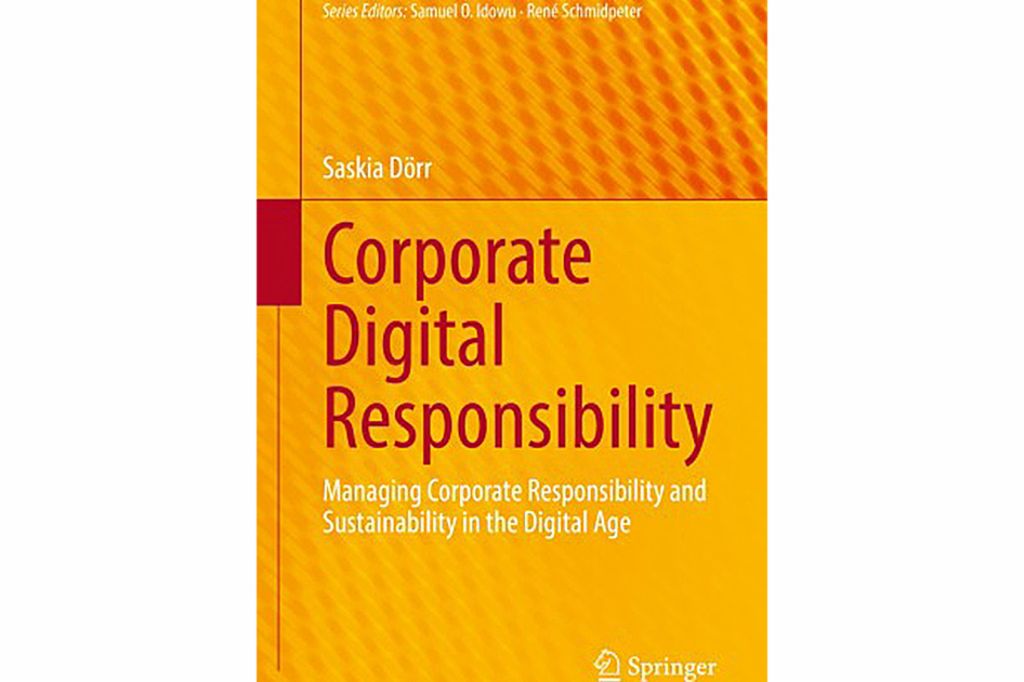We spoke to author and CDR expert Dr. Saskia Dörr from WiseWay. Passionately determined, she explains the ins and outs of the latest developments and why embracing CDR is so important.
Dr. Saskia Dörr, Founder of WiseWay
So what is CDR and why is it important?
SASKIA DÖRR: Let’s first address the terminology. Across Europe, the concept of corporate digital responsibility, or CDR, was first discussed back in 2015. Its counterpart in a global context, or more accurately in the Anglo-Saxon world, is digital ethics. While there are some theoretical differences, they both address how to deal with today’s digitalization. CDR is a set of practices and behaviors that help an organization to use data and digital technologies in ways that are perceived as socially, economically, and environmentally responsible. Take the use of chatbots, for example, or how we deal with information people provide when they visit a website.
Digitalization has been around for a long time.
Where did CDR suddenly come from? CDR is very much a reaction to societal development. The domination of the mobile Internet with all its related services has outpaced legislation, and we find ourselves in a situation in which the way our data are managed and exploited is pretty much a black box. Yet this runs counter to the zeitgeist. As the world becomes digitally more mature, lack of transparency is no longer acceptable. Something has to change. So what is being done to introduce this change? To date, companies have mostly had free rein to use data as they see fit. Now, legislation is catching up through initiatives all around the world. The German Ministry of Justice is introducing a CDR Code and mature programs are in effect in France, Poland, the UK and Switzerland, among others. The Swiss, for example, have introduced what they call “Swiss Digital Trust Label”, which allows companies to demonstrate their commitment to CDR through audits and certification. We also have started an international initiative known as the “CDR Manifesto”, in which we invite organizations to declare their involvement in CDR based on five principles. Yet all these initiatives are voluntary at the moment.
If CDR is voluntary, why should companies invest the extra time and resources?
(Laughs) Yes, that is the crux of the matter. If anything, CDR (still) represents a huge opportunity. The speed of digitalization has overwhelmed us all. Do you really know what is being done with your data? Doesn’t it scare you just a little that a single Internet search leads to advertisements popping up whenever you open a browser? The bottom line is that there is a huge deficit of trust related to digitalization. And trust is the basis of any digital interaction. Organizations that can instill a sense of trust in their digital activities are going to be at an advantage. But it goes beyond the interaction with users. Employer branding, for example, is a huge topic. The authenticity and trust expressed by CDR initiatives appeal strongly to generations Y and Z, so CDR can directly increase an organization’s attractiveness as an employer.

Organizations that can instill a feeling of trust in their digital activities are going to be at an advantage.
Dr. Saskia Dörr
Founder of WiseWay
How do organizations introduce CDR, and what should they watch out for?
Start small. Authenticity is key. But if trust and transparency are part of how you (want to) do business, CDR will enhance all areas. Our STEFI model provides five principles and a process for trustworthy data management:
- STEWARDSHIP: Manage your data in the name and interest of the organization and the person involved. Be clear about what you do with the data you give them. Do not use personal data out of context or for purposes that the individual does not expect, has not expected or has not consented to.
- TRANSPARENCY: Apply the principle of “no surprises.” Provide clear and relevant information to users, with ease of control. Be transparent about what data you collect and how you use and share it.
- EMPOWERMENT: Respect the interests, time and attention of the individual. Do not use “consent” as an excuse for bad practice. Put yourself in the “shoes of others” to understand the impact of your data handling and communication about it.
- FAIRNESS: Optimize benefits and reduce costs for all, including nonusers. Make ethical considerations clear in your development process and justify your design and implementation decisions. Do you create risks and costs that will be borne by others? Include the impact of failure or misuse in these considerations.
- IMPACT: Create added value for the community. Participate in open data or open source projects. Share your expertise in implementing digital ethics or digital responsibility.
Why ‘is the time now’?
We are witnessing a convergence of interests that has not yet reached its apex. Sooner or later, society as a whole and especially the upcoming digital natives will expect CDR. The black boxes will have to be eliminated, and regular legislation will demand it. Now it’s all voluntary. Smart organizations will capitalize on this and be early adopters. They will be the first to increase the trust of their clients. The first to be open with their employees and the first to appeal to the future workforce. Before we know it, this window of opportunity will have passed. And anyway – apart from the competitive advantage – digital responsibility just makes sense from a humane perspective, right?
You liked this content? Get in touch for more.
Sabrina Ebeling
Corporate Communications & Marketing
Phone: +49 40 2850-1480
Photo credits: BOSSE + Meinhard


